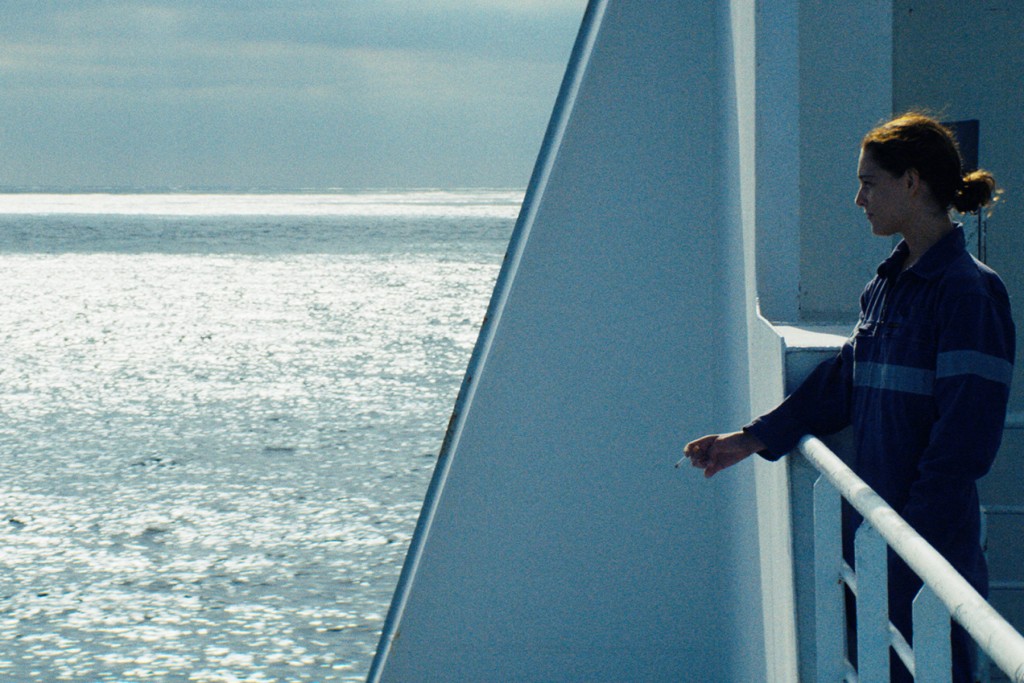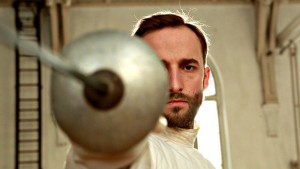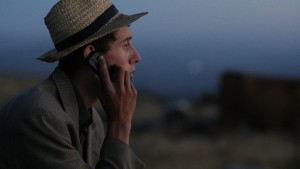By Gary M. Kramer.
The American Film Institute’s annual European Union Film Showcase screened December 1-20 at the AFI Theater in Silver Spring, Maryland. This year’s program, the festival’s 28th, opened with Spanish filmmaker Fernando León de Aranoa’s comedy-drama A Perfect Day, set in the Balkans, and closed with Radu Muntean’s provocative Romanian character study, One Floor Below.
All in all, 54 films from 28 countries unspooled. Ten films in the festival were the Official Academy Award submissions chosen to represent their respective countries. These included Malta’s Simshar, Denmark’s A War, and Lithuania’s The Summer of Sangailé. The festival also offered a sneak preview of highly anticipated films such as Nicholas Hynter’s The Lady in the Van starring Maggie Smith in the title role; Jacques Audiard’s Palm d’Or winning Dheepan, about Sri Lankan refugees in Paris; and Hungary’s Holocaust drama, Son of Saul. In addition, there are six U.S. premieres at the festival, including Luxemberg’s Baby (A)lone, Eva Nová from Slovakia, and The Snake Brothers from the Czech Republic.
The films range from challenging works, like Belgium’s extraordinary Violet, to crowd-pleasers, such as Matteo Garrone’s fabulous Italian fable, Tale of Tales, and documentaries including A German Youth. Here are reviews of five intriguing films that screened at the festival.
The Fencer, the Golden Globe-nominated drama from Finland, is set in Stalinist Russia, where the Estonian Endel (Märt Avandi) is forced out of Leningrad. He heads off to the rural Haapsalu to teach physical education at an underfunded school. His young students, however, become interested in fencing, when Endel introduces them to the sport. If the teacher is demanding, he gets through to the students, Marta (Liisa Koppel) and Jaan (Joonas Koff) in particular. However, the school’s hard-line principal (Hendrik Toompere Sr.) disapproves of his after-school club. He soon digs up dirt on Endel’s checkered past as a way of exacting revenge. In fact, the principal’s actions leads to possibly dire consequences in the film’s second half, when the students are eager to compete in Leningrad, a city where Endel is likely to be arrested upon arrival. (The film’s opening and closing titles cards are useful for explaining the politics of the time).
The Fencer mainly keeps the narrative taut regarding Endel’s political situation, despite a few clumsy scenes that play up Endel’s paranoia. More engaging are some poignant scenes Endel has with a love interest (Ursula Ratasepp) and the exciting, if clichéd, sports-movie finale. The burnished sepia-toned cinematography gives The Fencer an old-fashioned flavor, which is wholly appropriate for this crowd-pleaser.
You’re Ugly Too from Ireland, is writer/director Mark Noonan’s shrewd if slight comedy-drama about Will (Aidan Gillen of The Wire) getting released from prison early to care for his precocious 11-year-old niece, Stacey (Lauren Kinsella). He needs to make a go of things, but Stacey does not make it easy for him. She is foul-mouthed, and antagonistic, and after her mother’s recent death she has developed narcolepsy. Will takes her to a caravan in the country, where they meet Emilie (Erika Sainte), a lovely Belgian woman who is married to Tibor (George Pistereanu). While the characters eke out their lives—Tibor gives Will some work; Emilie tutors Stacey; Will tries to resist his attraction to Emilie—the story hinges on whether Will will get to stay out of jail and care for Stacey or return to prison to finish his sentence.
Mark Noonan captures the rhythms of his characters lives through some nifty editing that compresses the time and action. If the story pivots too much on the plot point of why Will went to jail, the winning performances by Gillen and Kinsella, especially compensate for this minor flaw. You’re Ugly Too is a modest film that yields several pleasures.
A Blast is a timely Greek entry that involves the country’s current economic crisis as a subplot. The film, directed and co-written by Syllas Tzoumerkas, opens with news of a fire—a blast that has been ignited. There are other blasts in this tough drama, as well: Maria (Angeliki Papoulia, of Dogtooth and The Lobster) blasts angry words at her mentally challenged sister, Gogo (Maria Filini); she spanks her invalid Mother (Themis Bazaka) in a moment of fury; and she dresses down her aging Father (Giorgos Biniaris) for ruining her life. Maria’s parents have created a crippling tax debt that has pushed her over the edge. She has long been struggling with her relationship with mostly absent husband, Yannis (Vassilis Doganis) who works on a ship whose horns blasts signify his absence. Maria is so desperate to escape her increasingly bad situation that she leaves her kids with Gogo, and flees.
A Blast toggles back and forth in time and between Maria’s and Yannis’ experiences—from erotic trysts to governmental bureaucracy—to show how things got so bad. The allegorical nature of the story, and Papoulia’s magnificent performance are the film’s strengths, but A Blast requires viewers to piece together the story fragments, which can be vexing. When Maria in her downward spiral of self-destruction watches porn videos in public, the scene may be her trying to recall her passion for her husband, or it may be a bid for sexual attention. Or both. But the scene itself has no payoff. Likewise, her confession at a group therapy session is supposed to be cathartic, however, it simply articulates what audiences already know. Regardless of whether A Blast fascinates or frustrates viewers, it will certainly leave an impression.
Fidelio: Alice’s Odyssey, is a compelling French drama about Alice (Ariane Labed), an engineer who leaves her boyfriend Felix (Anders Danielson Lie) behind to take a job on the title ship. The captain, Gaël (Melvil Poupaud) is her ex, and the sexual tension between them builds until they begin a hot and heavy affair. Fidelio shows Alice owning her sexuality; she can joke about the men she’s slept with on five continents with the male crew, but also rejects a pass from her superior, Fred (Nathanaël Maïni), who comes into her cabin one night. Later, when Alice has been given a position of power on the ship, she has a tryst with her subordinate, Vali (Bogdan Zamfir). The film, directed and co-written by Lucie Borleteau, also shows how Alice was not unlike the late La Gall (Jan Privat), whom she replaced on the crew. Reading the diary she left behind, Alice makes some interesting parallels to her predecessor. Borleteau also gives viewers a sense of life aboard the ship, with the rockiness of the ocean and the boredom and loneliness, but also the crisis, as when there is a blackout or engine trouble. If Alice’s odyssey is mostly a personal journey of self-discovery, it is a worthwhile trip nonetheless.
Lastly, João Pedro Plácido’s observational documentary (Be)longing (Volta à Terra) is set in Uz, a rural village in northern Portugal. Daniel is a 21 year-old farmer who has been working the land since dropping out of school in the 9th grade. This gorgeous film, shot over a year in Daniel’s life, shows the beautiful scenery, from stony paths and misty (or muddy) fields, to the stables where sheep are sheared, or cows give birth. Plácido lets his subjects’ express their lives and thoughts, as one farmer laments about money and the EU, stating, “Those who work the most, earn the least.” Daniel, who enjoys his work (for the most part), is seen tending to mating cows, bleeding pigs, and attending threshing contests. (Be)longing takes viewers into village meetings and parties, where Daniel eventually reconnects with a former classmate whom he finds himself attracted to. This quiet, unhurried film unfolds naturally, like the seasons do, providing an interesting slice of life of the difficult but rewarding life Daniel and his family leads.
Gary M. Kramer is the author of Independent Queer Cinema: Reviews and Interviews, and co-editor of the recently published Directory of World Cinema: Argentina.




